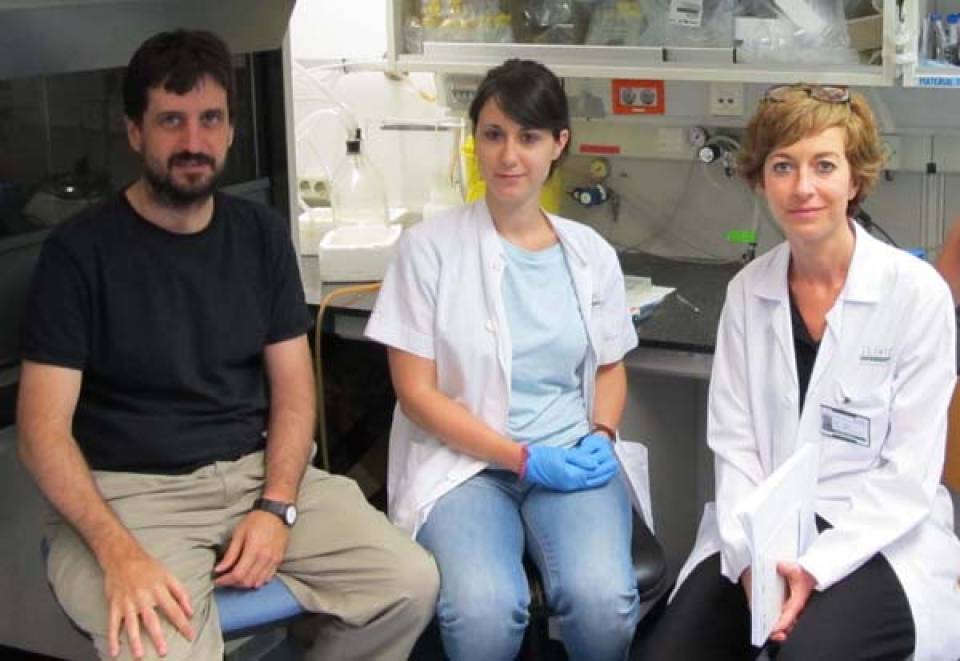Dr. Jordi Alcaraz, from the Biophysics and Bioengineering Unit of the Faculty of Medicine, and Dr. Noemí Reguart, oncologist at the Hospital Clínic of Barcelona and IDIBAPS researcher, lead this study. The Bosch i Gimpera Foundation, as the Technology Transfer Office of the UB, has managed the partnership contract.
Nintedanib is a drug that has shown great efficacy in patients with advanced lung adenocarcinoma. Its mechanism of action is based on inhibition of growth factor receptors, proteins that are produced outside of the cancer cell and, when binded to specific receptors, stimulate tumor growth. "The pulmonary adenocarcinoma is the most common subtype of lung cancer and we need to identify new therapeutic options in the context of a second line of treatment," explains Dr. Noemí Reguart. "This is an oral drug with very good tolerance and, in recent clinical trials, has shown that in combination with chemotherapy as a second-line treatment improves survival ," she adds.
This study goes a step further and will investigate its effectiveness in squamous cell carcinoma. Researchers will use preclinical cell culture models, unique in Spain, which allow the interaction between the two most abundant cell types used in cancer: cancer cells and fibroblasts, a type of healthy cells that surround them. The main objective of the project is to find what kind of cells within the tumor are more or less sensitive to nintedanib, to better define which patients can benefit from this drug. "We know that fibroblasts are involved in all stages of tumor progression, since its inception, growth, invasion, metastasis and even resistance to therapies," explains Dr. Jordi Alcaraz. "We will use this preclinical culture models to reproduce more precisely the cellular microenvironment and to explore how to make resistant cells respond to nintedanib" says Dr. Alcaraz.
This preclinical research is the previous stage before the application to the cancer patient. "The introduction of new targeted therapies such as nintedanib in the treatment of lung cancer, has been a breakthrough in the treatment of this disease," says Dr. Noemí Reguart. "Nintedanib is the second antiangiogenic drug that gets approval from the European Medicines Agency for the treatment of advanced lung cancer and will soon be available in all national hospitals as a new treatment option"."With this project, we aim to identify the mechanisms of tumor resistance to nintedanib to expand the clinical benefit to a wider range of patients with lung cancer," she adds.
This public-private agreement reflects the commitment of the three organizations involved for quality research on a topic of special emphasis on health such as lung cancer and, in particular squamous carcinoma, which affects about 30% Patients with this type of tumor.
Lung cancer
Lung cancer is a disease with a high mortality associated, and remains the leading cause of cancer death worldwide. With about 1.6 million new cases each year, accounts for 1.38 million deaths annually. In 2012, in Spain were diagnosed 26,745 new cases, that represent the 12.5% of all cancer diagnoses. The International Agency for Research on Cancer expects that the number of lung cancer deaths will continue to rise worldwide, exceeding 2.3 million in 2030.
Lung cancer is divided into adenocarcinoma, squamous cell carcinoma and other less common types, and most patients with lung cancer are diagnosed in advanced stages of the disease. Theidentification of new therapeutic options based on molecular targeted drugs is of great importance for the clinical translational research in this disease.

